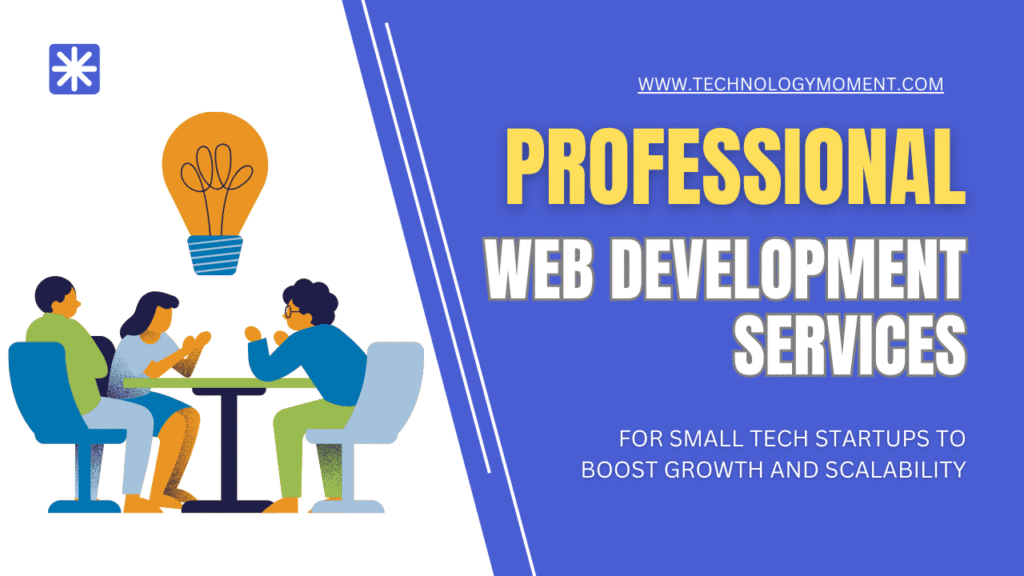
At Technology Moment, we believe every great startup begins with a spark—but it’s the digital presence that truly fuels its growth. In today’s fast-moving tech world, having a groundbreaking idea isn’t enough. That’s where web development services for small tech startups come in.
For small tech startups, a website is more than just a digital business card—it’s the first impression for potential customers, investors, and partners. A well-crafted site can showcase your vision, prove your credibility, and open doors to opportunities that might otherwise remain closed. Think of it as the launchpad that helps your ideas reach the right audience.
This article explores how professional web development services can accelerate startup growth. From building trust and attracting investors to competing with industry giants, we’ll uncover why investing in the right web solutions can make all the difference for young tech companies ready to scale.
Why web development services for small tech startups
You Google it. If nothing shows up or the site looks outdated, the chances are you’ll move on. This is why web development is more than just a design project; it’s a growth strategy.
A well-developed website becomes your digital handshake. It tells the world that you’re serious, professional, and ready to compete. For investors, it’s the first sign of legitimacy. They want to see your vision clearly represented, whether through case studies, product demos, or a polished pitch deck section on your site. If that experience is smooth, clear, and engaging, you’ve already won half the battle.
Moreover, web development helps startups compete with larger businesses. While big companies may have deep pockets, a smaller startup can still shine online with a creative, responsive, and smartly built website. It’s the equalizer that allows a new idea to stand shoulder-to-shoulder with industry giants.
Table of Contents
Core Web Development Services for Startup Growth
When we talk about core services, we’re not just talking about creating a basic site. We’re talking about building a digital ecosystem where your startup can live, grow, and thrive.
The first and most essential service is website design and development. This isn’t about stuffing a page with visuals; it’s about designing an interface that speaks your brand’s language and helps visitors navigate effortlessly. A great design captures attention, but great functionality keeps users engaged long enough to convert curiosity into action.
Next is a mobile-friendly and responsive design. Imagine showcasing your product to an investor, only for your website to break on their mobile screen. That’s a deal breaker. Responsive design ensures your website adapts seamlessly to all devices, from laptops to tablets to smartphones.
For startups that sell directly to customers, e-commerce development becomes crucial. It’s not just about setting up a shopping cart; it’s about creating a frictionless buying journey where payments, product displays, and customer support feel effortless. In a world of one-click checkouts, startups can’t afford clunky buying processes.
Another key service is web application development. Many tech startups today are built on SaaS or digital platforms. A strong, interactive web app enhances engagement and provides value beyond static pages. Whether it’s a project management tool, a customer portal, or a data dashboard, custom web applications create an edge.
And then there’s API integration and custom features. Startups don’t work in silos—they need payment systems, CRMs, marketing automation, and analytics. Instead of reinventing the wheel, APIs let you connect seamlessly with existing tools. This integration allows startups to scale faster while maintaining efficiency.
Advanced Web Solutions for Tech Startups
Startups that want to think ahead must embrace advanced web development solutions. Cloud-based applications, for instance, allow businesses to be agile. With cloud integration, your website or app isn’t bound to a single server—it becomes scalable, secure, and accessible worldwide. For global startups, this flexibility is a game-changer.
Artificial intelligence and automation are also redefining the startup landscape. From AI chatbots that provide instant customer service to personalized recommendations powered by machine learning, these tools turn a simple website into an intelligent growth engine.
SaaS platform development is another frontier. Many small tech startups are essentially SaaS companies at their core. Building a reliable SaaS platform isn’t just about coding; it’s about designing a system that can handle thousands of users, scale on demand, and integrate seamlessly with other tools. This requires forward-thinking web development practices that go beyond traditional websites.
These advanced solutions are not optional extras—they’re the building blocks of sustainable growth in a digital-first economy.
The Role of SEO in Startup Growth
What good is a sleek digital platform if no one can find it? This is where search engine optimization (SEO) becomes the backbone of startup visibility and growth.
Technical SEO lays the foundation. A startup’s website must be fast, secure, and easy for search engines to crawl. Things like clean code, structured data, and optimized loading speeds may sound technical, but they directly affect whether your site appears in Google’s top results or gets buried on page ten.
Content-driven SEO builds on this. Startups need to tell their story in a way that resonates with their audience while also satisfying search algorithms. Blogs, case studies, whitepapers, and product guides not only showcase expertise but also attract organic traffic from people searching for solutions your startup provides.
Local SEO is another growth driver, especially for startups targeting specific markets. Whether you’re a fintech startup in Singapore or a healthtech company in Berlin, optimizing for local searches ensures you’re visible to the right audience at the right time.
Without it, even the most innovative startup risks becoming invisible in a crowded digital space.
Security and Scalability
When it comes to web development for startups, two words often separate success from disaster: security and scalability. Startups may not always have massive customer traffic at first, but as the brand grows, the demands on the website or app multiply.
Cybersecurity Best Practices
Imagine spending months building your tech product, only to face a data breach that wipes away user trust overnight. For startups, reputation is everything, and once trust is broken, it’s nearly impossible to rebuild. From using SSL certificates and secure hosting environments to implementing encryption for sensitive data, these practices protect not only the company but also customers.
Authentication systems, like two-factor authentication (2FA), and strong firewalls are no longer optional—they are essentials. A single hack could turn away potential investors, who often check how secure your digital assets are before signing a deal.
Scalable Infrastructure for Future Growth
Scalability is about preparing for tomorrow’s success today. A startup website may begin by handling a few hundred visitors a month, but what if a product suddenly goes viral? Without a scalable infrastructure, downtime or lag could frustrate potential customers and cost thousands in lost revenue.
Using cloud-based hosting solutions, microservices architecture, and scalable databases ensures that your web platform grows seamlessly as user demand rises. Startups targeting global markets must consider performance across regions—fast-loading websites in New York should be just as quick in Tokyo or Berlin. Scalability ensures consistency in customer experience worldwide.
Cost-Effective Web Development Strategies
Most startups live on a shoestring budget, which makes cost-effective strategies a necessity. It’s not about cutting corners but rather about making smart decisions that balance affordability with long-term value.
Open-Source Tools and Frameworks
Startups can save thousands by leveraging open-source technologies. Platforms like WordPress, Django, or React not only reduce development costs but also give startups access to global developer communities.
Outsourcing vs In-House Development
Many founders struggle with whether to build a team internally or outsource. In-house teams offer better control but come with higher costs in salaries, infrastructure, and training. Outsourcing to experienced global development agencies, especially in tech hubs like India, Eastern Europe, or Southeast Asia, can deliver quality solutions at a fraction of the cost.
The smart move? Many successful startups use a hybrid model—outsourcing their MVP to experts and later building an in-house team for scaling.
MVP (Minimum Viable Product) Approach
One common mistake startups make is trying to build a “perfect” product before launch. Instead, developing a Minimum Viable Product allows you to enter the market faster, collect real user feedback, and make improvements without wasting resources. This lean approach saves both time and money while helping validate the idea with real-world data.
Common Mistakes Startups Make in Web Development
No matter how innovative the idea, a weak approach to web development can derail startup growth. Identifying and avoiding these mistakes early can save founders from costly lessons.
Ignoring User Experience
Many startups pour energy into flashy features but forget about the basics—smooth navigation, fast load times, and simple design. A complicated interface can make even the most promising product feel frustrating. If users can’t figure out how to use your platform in minutes, they’ll leave.
Overcomplicating Features
It’s tempting to include everything at once—AI, chatbots, e-commerce, integrations—but cramming too many features into the early version of a product often creates confusion. Startups need focus. The first version should solve one problem really well before branching out.
Lack of Scalability Planning
A website that works fine with 100 users might crash with 10,000. Many startups overlook scalability until it’s too late. Poor planning can mean rebuilding from scratch, which wastes precious time and money. Planning for scalability from day one helps avoid this trap.
Neglecting Security
Yet many startups delay implementing proper security until they “grow bigger.” This mistake can be fatal in today’s world, where cyberattacks target even the smallest ventures.
Future Trends in Web Development for Startups
The digital landscape moves fast, and startups that stay ahead of the curve can gain a massive competitive advantage. Future-focused web development strategies allow small tech startups to compete with giants on a global scale.
Progressive Web Apps (PWAs)
PWAs are transforming how businesses connect with users. They blend the best of websites and mobile apps—fast, reliable, and installable directly from the browser. For startups, PWAs reduce costs since they eliminate the need to build separate native apps for Android and iOS.
Voice Search Optimization
Startups optimizing their websites for natural, conversational queries will stand out in global markets. It’s no longer about keywords alone—it’s about answering questions people ask out loud.
AI-Driven Personalization
Artificial Intelligence is becoming the backbone of user engagement. From personalized recommendations to smart chatbots, AI helps startups deliver customer experiences that feel tailored and unique. Even small startups can integrate AI tools to match user behavior, making their platforms feel as advanced as those of established players.
Sustainability and Green Hosting
Globally, users are becoming more eco-conscious. Startups that embrace green hosting solutions and energy-efficient coding practices not only reduce costs but also build a brand identity aligned with sustainability values—a big plus when appealing to modern consumers and investors.
How to Choose the Right Web Development Partner
When you’re building a startup, your choice of web development partner can literally decide how fast you move from “just an idea” to a profitable business. Think of it like choosing a co-pilot—you want someone who knows the terrain, can navigate storms, and helps you reach your destination smoothly. But how do you make the right pick in a world full of agencies and freelancers claiming to be the “best”?
A partner with experience in building websites and apps for startups understands the challenges you’ll face—tight budgets, time constraints, and the need for scalability. Instead of flashy promises, check what they’ve actually delivered. Case studies, client reviews, and real-world results tell you more than a sales pitch ever could.
Equally important is communication and project management. Startups move fast, and you can’t afford endless delays or miscommunication. Your web development partner should speak your language—not just technically, but also in understanding your business goals. A good partner explains things in simple terms, gives you realistic timelines, and updates you without you having to chase them.
Launching a website or web app isn’t the finish line—it’s just the beginning. Bugs pop up, features need to be added, and technologies evolve. If your partner disappears after launch, you’re left scrambling for solutions. The right partner grows with you, providing ongoing technical support and helping you adapt to new opportunities.
Lastly, consider cultural fit and trust. A startup journey is intense, and you’ll be working closely with your development team for months, maybe years. Choose someone who values collaboration, respects your vision, and aligns with your work ethic. When you find that match, your web development partner becomes more than a service provider—they become part of your growth story.
Conclusion
For small tech startups, web development isn’t just about having a pretty website—it’s about creating a digital foundation that can support growth, attract investors, and engage customers worldwide. A strong online presence gives startups the power to compete with bigger players, while advanced features like SaaS platforms, APIs, and AI integration prepare them for global opportunities.
But technology alone doesn’t guarantee success. Startups need to balance creativity with strategy, design with functionality, and innovation with affordability. Choosing the right web development partner ensures you’re not just building a product, but also building momentum.
In today’s hyper-connected world, every click, every second of user experience, and every line of code contributes to how the world sees your brand. When done right, web development is not an expense—it’s an investment in your startup’s future.
FAQs
What type of website should a small tech startup build first?
It depends on the business model. If you’re offering software or digital services, a clean, informative website with a focus on product demos and sign-ups is best. For product-based startups, an e-commerce-ready site helps generate sales from day one.
How much does web development cost for startups?
Costs vary based on complexity, features, and whether you hire freelancers, agencies, or in-house developers. A basic website might cost a few thousand dollars, while complex SaaS platforms can run into tens of thousands. The key is starting lean with an MVP and scaling as you grow.
What is the best tech stack for startups?
There’s no one-size-fits-all answer. Many startups use stacks like MERN (MongoDB, Express, React, Node.js) or MEAN (MongoDB, Express, Angular, Node.js) because they’re fast, scalable, and cost-effective. But the best stack depends on your goals, budget, and target audience.
How can web development improve investor confidence?
Investors want to see that you’re serious. A professional, functional website shows that you have traction and are ready for scale. It also provides proof of concept—users can test your idea in real time, making your pitch more convincing.
Should startups focus on apps or websites first?
Websites usually come first because they’re cheaper, faster to build, and more accessible globally. Apps can follow once you’ve validated your product and gained enough users to justify the extra investment.













